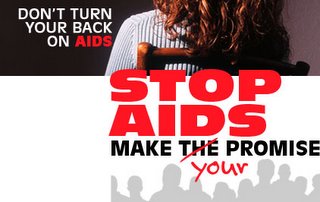quarta-feira, novembro 30, 2005
As promessas dos governos

AIDS: Promises, promises…
But how many get delivered?
World AIDS Campaign calls for greater accountability of leadership
AMSTERDAM, 29 NOVEMBER, 2005: Governments and international agencies are coming under unprecedented pressure to answer for the specific HIV and AIDS commitments and promises they have made.
In a new report[1][1], the World AIDS Campaign (WAC) closely examines AIDS statements, commitments and declarations by governments and the United Nations (UN) in the past five years, and asks how they hold up under scrutiny as genuine ‘promises’.
With AIDS at the end of its first quarter-century, the epidemic isn’t going away – and despite good intentions, its impact continues to grow in all countries. ‘Stop AIDS. Keep the Promise’, the rallying theme of the WAC, recognises the growing gap between what governments say they will do about HIV and AIDS, and what they actually achieve.
“We have been asked to stomach year after year of rhetorical statements disguised as commitments on AIDS,” said WAC Executive Director, Marcel van Soest. “The litany of broken promises now rings hollow against the unrelenting advance of the epidemic throughout the world.”
The new WAC report – titled ‘Promises, Promises…’ – argues that the most significant AIDS promises were made during a special session of the UN General Assembly in June 2001. The meeting produced the UNGASS Declaration of Commitment on HIV/AIDS, which was solemnly adopted by all 189 Member States of the UN. Progress against the 2001 commitments is currently under review and will be presented in mid-2006.
With hindsight, the WAC report argues, many previous HIV and AIDS declarations that were seen at the time as commitments and promises, simply restate the current understanding of the epidemic, and avoid committing to concrete deliverables.
“While the EU statement today from Tony Blair is broadly welcomed as an expression of political commitment, especially given the expansion of the union,” suggested van Soest, “it contains little by way of specific promises or timetables on what European governments will achieve and, more importantly, when.”
When the G8 meeting and UN World Summit earlier this year committed to scale-up HIV prevention, treatment, care and support services, “with the aim of coming as close as possible to the goal of universal access to treatment by 2010 for all those who need it,” they carefully avoided making watertight promises and no road map was put forward as to how this goal would be achieved.
“As a result of previous disappointments, there is a greater call for AIDS accountability, and the volume is getting louder” said van Soest. “It is being spearheaded by more effective civil society advocacy and campaigning that increasingly challenges governments and the non-profit sector, using previous AIDS commitments and promises as benchmarks.”
###
The goal of the WAC is to energise and support an effective and sustained response to the AIDS epidemic. By helping partners to work together at national and international level, we will broaden the partnership of those shaping the response to AIDS. Crucial to our success will be increased public awareness of past policy commitments and promises on AIDS, including the Declaration of Commitment on HIV/AIDS. On these promises we will hold our governments accountable.